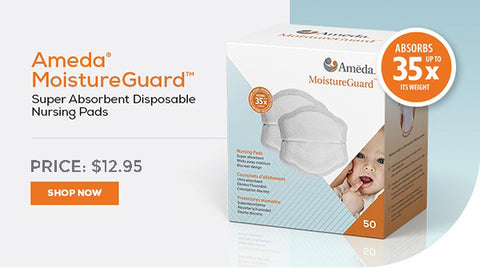
Breastfeeding A Teething Baby
By Lisa Fields
Your baby's first tooth is an exciting milestone to brag about on social media and in your baby book.
However once you catch a glimpse of that beautiful pearly white poking emerging out of your baby's gums, you may become a little nervous... What if breastfeeding becomes painful? What if your baby bites you when they are nursing?! Are your breastfeeding days numbered?!
Luckily, the presence of a tooth (or teeth) will not interfere with breastfeeding. In fact, breastfeeding once your baby starts getting teeth is encouraged! The World Health Organisation recommends exclusive breastfeeding for a minimum of 6 months up to 2 years or as long as the mother and baby would like. Most babies start getting their teeth when they are around 6 months old. A lot of mothers breastfeeding for much longer than a year without any issues... and their children may even have an entire mouth full of teeth by then!
If you intend to continue breastfeeding once your child starts getting their teeth, here is what you should know:
No need to worry about Nipple Biting while Breastfeeding
If you are worried that your baby may bite your nipple whilst you are breastfeeding, you may have forgotten that babies are interested in much much more of your breast than just the nipple while nursing. Babies generally take the entire areola into their mouths, not just the nipple! While your baby has this much breast tissue inside of their mouth, it is not possible for them to clamp down on your nipple! Phew...
The nature of breastfeeding makes it impossible for your little bub to bite you when they are actively nursing. When they are latched onto your breast, bub will extend their tongue outwards, over their lower gum, which protects you from any teeth that may be present. With their mouth wide open, you shouldn't notice any upper teeth either. If you do begin to notice the presence of teeth on your breast when nursing, try adjusting to a new position to encourage a wide open mouth and a good deep latch.
Nipping may happen post-feeding
As babies develop, they explore new activities to try and understand the world around them and how their bodies work. Many babies may be curious to see what happens if they give your breast a little 'nip' when they are feeling alert and playful. This generally happens after they are finished feeding, when they still have access to your breast. Hungry babies are generally too absorbed with feeding and getting their much needed breast milk than to nip you.
When a baby bites or nips, it can be a quick and painful surprise. If this begins to happen, you can quickly teach your baby not to do it again. As soon as your baby bites or nips your breast, place your finger in the corner or their mouth to break the suction seal that keeps your breast tissue in their mouth. Quickly extract your breast, look your baby in the eye and calmly tell them "No" or "No biting". Do not offer your breast again straight away.
It is important to be very firm but also calm and unemotional. Do not yell "NO!" or put too much emotion into your reaction. Your natural instinct may be to yell or scream in pain, but making too big of a fuss can backfire. If your baby connects the nip with your outburst, they may try to nip again to arouse the same reaction. Try to be as firm and boring as possible by calmly saying "No."
After you have been bitten or nipped, be sure to pay close attention to when your baby finishes their feedings so your breast tissue doesn't linger in their mouth. Once bub slows down and is no longer rhythmically sucking and swallowing, place your finger in the corner of their mouth to break the seal and remove your breast right away. They can't nip or bite if he does not have access to your breast. Fortunately for you (and your breast), this is usually a very short-lived phase, if it happens at all.
PICTURE HERE
Breastfeeding soothes a teething baby
When your little one is teething, they may be fussier than usual... Understandably so! It is painful when sharp teeth are trying to make their way through the gums. During your baby's teething period, your baby may rely upon breastfeeding more than ever as soothing comfort for when they are in pain. Your breast milk and the closeness between you two should serve as a sweet distraction for bub.
An actively teething baby may want to bite down on something firm to help ease their discomfort. You can offer your baby a cool (not frozen) rubber teether or massage their gums with a clean finger before or after you breastfeed. This may help to discourage them from trying to bite or nip.
DISCLAIMER:
Ameda Australia strives to present you with accurate and useful breastfeeding information. This article may contain information and ideas that are not necessarily the views of Ameda. It does not constitute medical advice. If you have any questions please contact your healthcare professional.

